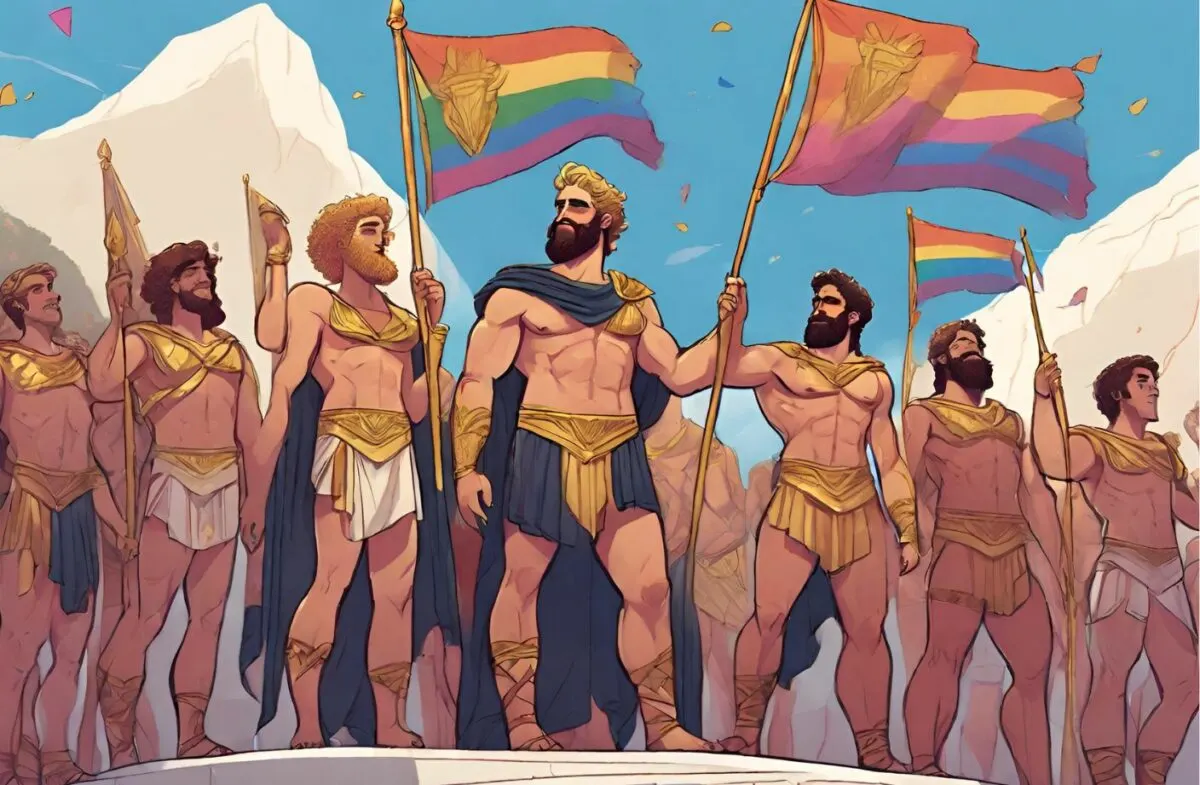Many people consider the eras preceding our own, especially those before the Renaissance, as periods dominated by wars and strenuous labor. This perspective is largely influenced by perceptions of the Dark Ages and medieval times.
However, the ancient world, including its narratives of gay Greek gods, presents a significantly different reality than many might expect. This era, rich in culture and mythology, diverges from the commonly held views of the past, revealing a society with complex understandings of identity and relationships that challenge our modern assumptions.
It was surprisingly developed, strong in culture, and a whole planet away from the society that we live in today. In fact, many societal issues that we have today were not present in old times, especially when it came to gender and gay relationships.
While the wear of time has naturally eroded away most of what was back then, a thousand or even many thousands of years ago, our modern technology and dedicated research has allowed us to form well-educated opinions and theories about what life was like, and what the people who came before us achieved. This is especially true when it comes to ancient Greece – a civilization of great mystique and power, rivalling the Roman Empire in societal complexity and strength of reign.

It goes without saying that one of the most interesting parts about investigating ancient cultures is religion. After all – these are people from a time without technological science, where much about the world remained utterly unexplained to the common man.
Greek religion, often synonymous with mythology, embodied a polytheistic framework, attributing various life aspects to distinct deities—like the sky and thunder to Zeus, and the hunt and wilderness to Artemis. Polytheism denotes a belief system with multiple gods, a concept that finds ample illustration in Greek mythology. This pantheon officially includes twelve principal deities, yet the myriad of legendary figures beyond this core group is vast. Prepare yourself for an enthralling journey; the Greek gods frequently depart from saintly behavior, offering tales that are as wild as they are captivating.
With that said – let us march on through the top ten gay (or queer adjacent!) Greek Gods that you should know!
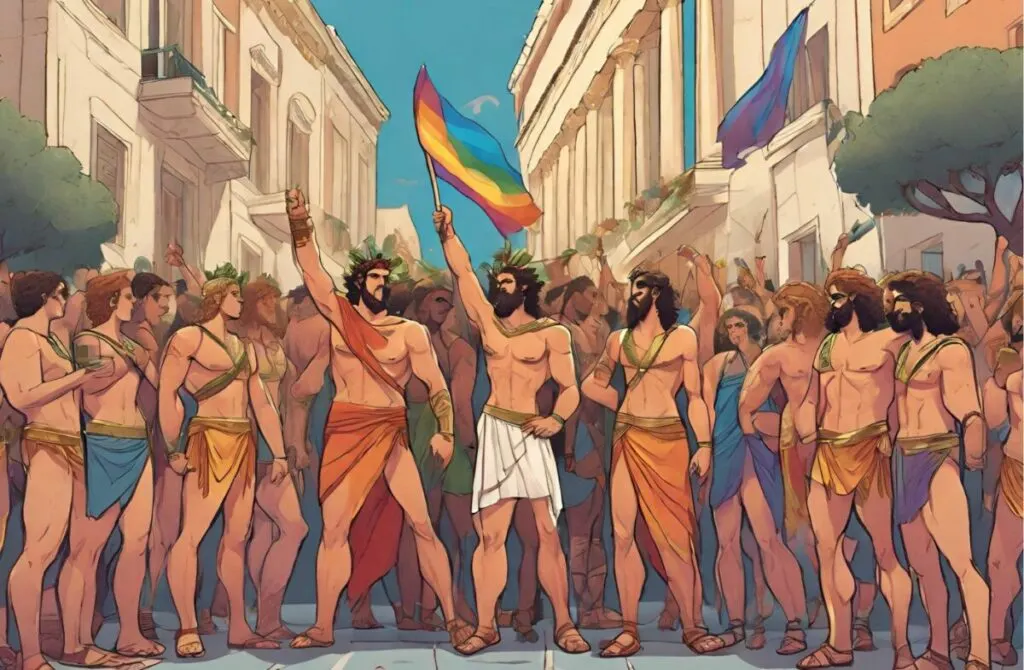
In this article we will cover...
#1) Pan
Taking up the form of a man with a human torso and the legs of a goat, Pan is a god of music, shepherds, the wilderness, and rustic festivities – enjoying hosting great parties and orgies in his own honor. His name constitutes the origin of the Pan flute, an instrument which he is pictured to have had with him almost constantly, and is a trademark of his presence.
Famous for his flirtations with all those who attended his sessions of debauchery, Pan is said to have had no particular preference when it came to the gender of his partners. His frivolous, joyous nature made him an attractive motif for many followers of both modern and ancient paganism, and his image was well adapted into legend, though he was not necessary presented as a god. Satyrs share Pan’s form – human torso and animal legs – and were his companions during his festivities, forming a large part of his historical artistic image.
Pan’s name shares origins with the ancestors of the English word ‘pasture’ and ‘pastor’, and the character is also strongly associated with nymphs – minor nature deities that are considered to be related to mermaids and other ‘maidens’ of the natural world. Their name is present in the mental condition ‘nymphomania’, which is used to define a fixation on sexual acts or objects. The more that one knows about Greek gods, the more that you learn both how… excitable they were, and how tied their names are to modern times!
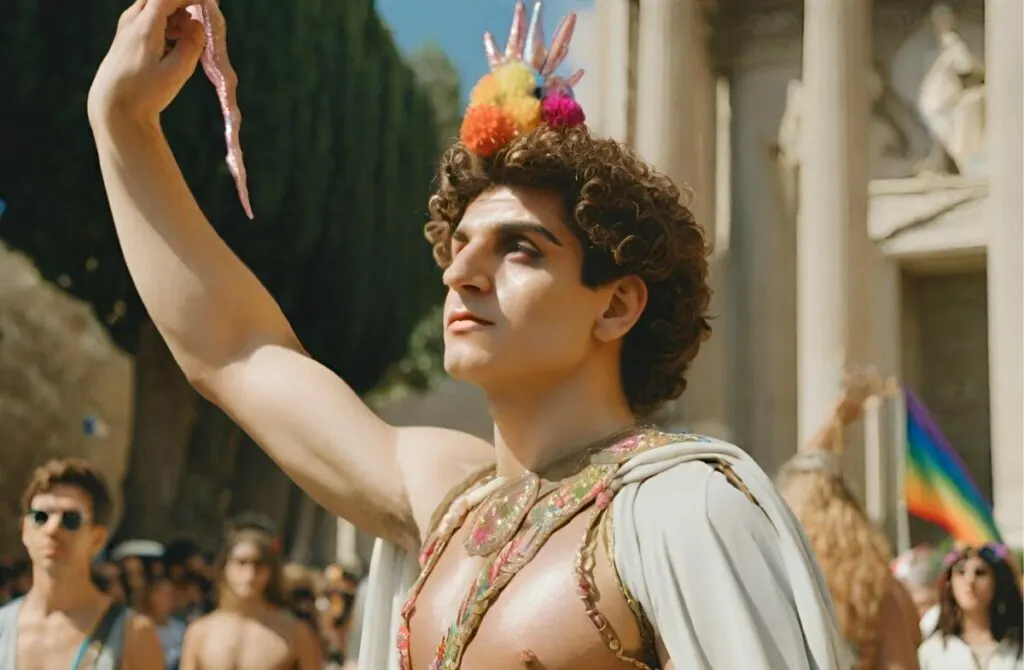
#2) Dionysus
Dionysus is known as the god of wine, celebration, and of drunkards, and while that along gives enough suspicion to the fact that he might be just as much of a sleep-around as the rest of his kin, what makes it infinitely more convincing is that he was originally the god of fertility. That’s another high-profile addition to the already expansive list of things of which he is the patron. Other entries include winemaking and harvest, vegetation as a whole, festivity, insanity, ritual madness, religious ecstasy, and – perhaps most puzzling of all – theatre.
Regarding the fascinating realm of gay Greek gods, it’s indeed compelling to highlight that Dionysus’s narrative not only justifies his inclusion on this list unequivocally but also reveals deeper connections to queerness than initially apparent. Remarkably, Dionysus experienced birth twice—transitioning from his mother’s womb to the thigh of his father, Zeus, mid-pregnancy. This unique birth situation arose because Dionysus was an illegitimate child, leading to his upbringing as a girl, primarily to protect him from Hera, Zeus’s wife, whose jealousy over his existence was intense. Such stories underscore the complexity and wildness of Greek mythology, marking merely the beginning of its rich tapestry.
After being driven mad by his jealous mother, Dionysus made out onto the world on his own and established a cult for his own worship after being made sane again by the goddess of a similar cult. After this point, Dionysus was nearly always accompanied by Satyrs – creatures notorious for having unstable carnal appetites – and shared relationships with his disciples with seemingly little regard for gender, while also engaging with all genders casually.
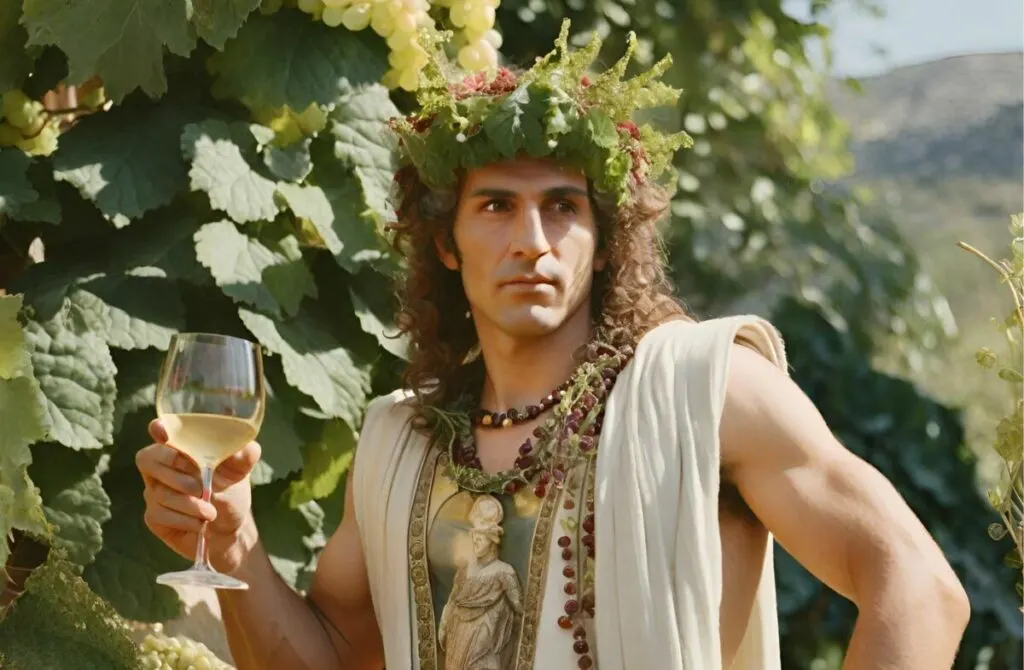
#3) Aphrodite
Perhaps the second or third most famous deity out of all of those on this list, coming just shortly after Zeus and Achilles, Aphrodite’s character in mythology certainly lives up to the reputation that her name has in modern culture.
Her origins are deeply entwined with the island nation of Cyprus, where she is said to have emerged from the ‘aphrós. of the sea near this locale. The goddess was born from the ‘aphrós’ or foam of the sea that resulted from Cronos castrating his father and tossing the remains into the ocean. This gave rise to her name and fueled her sexually intense nature. Known for giving her energy to and taking part in her own fair share of intimate shenanigans, Aphrodite lived by impulse and freedom, and often insisted that her disciples and those under her influence did the same. This trait sometimes came to a fault, as she was well known as a cheating wife and frequent fraud.
But how exactly does any of this make her a gay god? Well – thanks to both classical legend and the works of famous Greek poet Sappho, Aphrodite is known as the patron goddess of lesbians, and is said to have taken on many female lovers herself, following after the rest of her kin in maintaining a largely bisexual approach to intimacy.
Despite the fact that her image was strongly forbidden by the church of the Middle Ages, Aphrodite remains perhaps one of the most influential figures in Greek legend, with many aspects of culture stemming from her personage and name, including several other gods in other religions or systems of mythology than ancient Greece’s own.
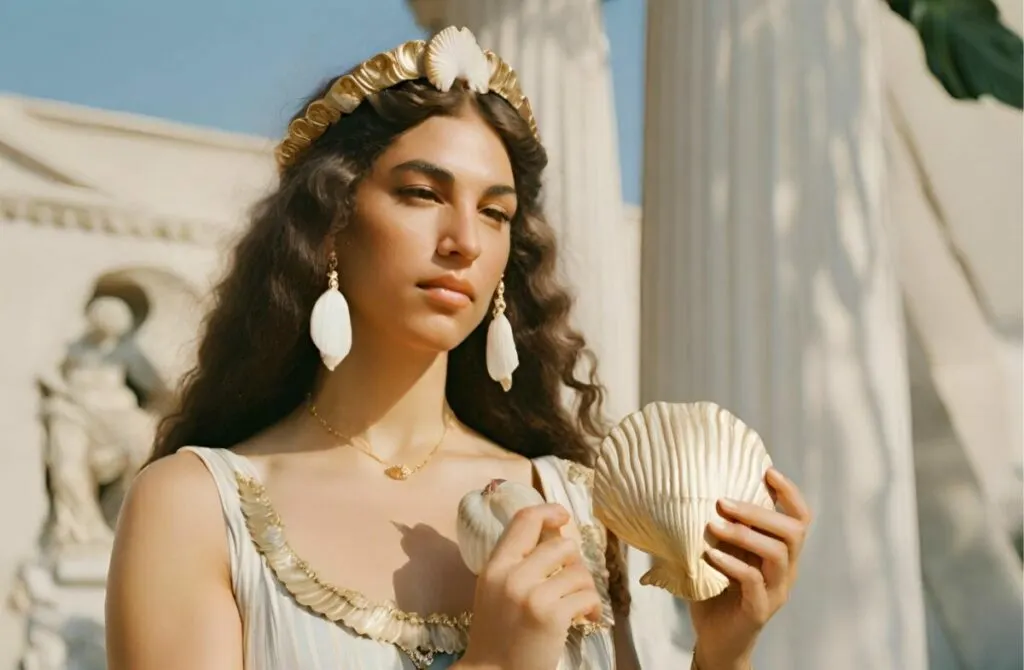
4#) Antinous
While Antinous joins the rank of figures on this list that were not strictly gods – or at least were not born gods, and later adopted into divinity in respect for the merit of their deeds in mortal life – Antinous’ story is incredibly influential in Greek legend, given the sheer scale of mourning and theatre surrounding his death and his annotation as part of the gods.
Antinous was a Greek youth taken under the wing of the Roman emperor Hadian as a court favorite and lover after being introduced to the ruler several years earlier. He was said to have been around 17 at the time, and accompanied the emperor almost everywhere until he was said to have died at the age of 19 under mysterious circumstances.
Some sources claim that the death was an accident, and that the young man drowned in the Nile given that the emperor was visiting Egypt at the time, but other historians make nods towards murder from political competitors, jealous suitors, or even human sacrifice.
We may never know what truly happened to Antinous, but what happened after his death is history. The emperor Hadian responded to his death by having the young man considered a martyr, a hero, and a god, and held a ceremony to facilitate his ascension to divinity. Definitely a tale of loss and drama worthy of Shakespeare, and although the moral standing of a lot of his story divides opinions, the fact history still remembers Antinous’ name is undoubtedly remarkable.
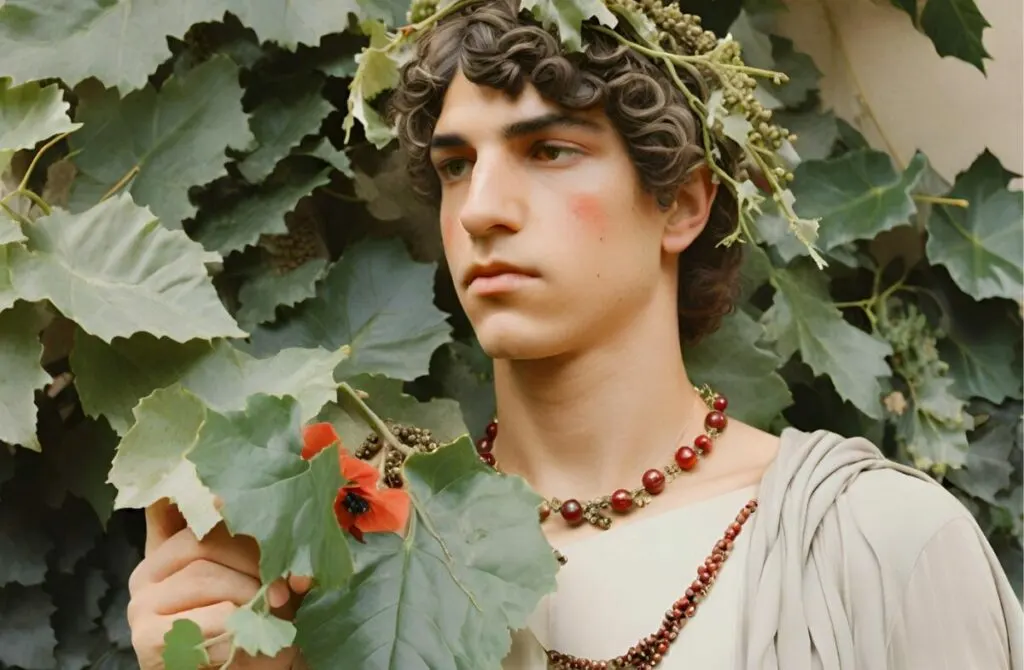
#5) Apollo
Seen as the most handsome and spectacular god of all, Apollo is the patron of music, archery, truth, and healing, representing all of the most famed strengths and powers of the ancient Greeks. Apollo’s twin sister was Artemis, the goddess of the hunt, who was also one of the most revered and honored out of the Greek pantheon.
Not only is he important in this way, but Apollo is also quite crucial in queer history, as his romance with Thracian performer Thamyris is said to be the first recorded gay relationship between men in the entire records of history – at least in a mythological sense.
In the realm of gay Greek gods, Dionysus’s romantic endeavors extend beyond his liaison with Thamyris to include his love affair with the Macedonian Prince Hyacinthus. This relationship took a tragic turn when Hyacinthus died from an accident involving a thrown discus. In response, Dionysus honored him by transforming him into the first-ever hyacinth flower. However, it’s noteworthy that the Hyacinth flower named after this event does not match the one described in the original myth, leading to speculation and confusion regarding the evolution of the flower’s name and its significance in relation to the demise of Apollo’s most cherished love.
This does not take away from the fact that the god’s reaction and despair at Hyacinthus’ death is a common subject discussed and idolized over by historians, however, and instead only helps it be market as yet another one of Apollo’s great contributions to the history of queer relationships etched into the tomes of ancient history.
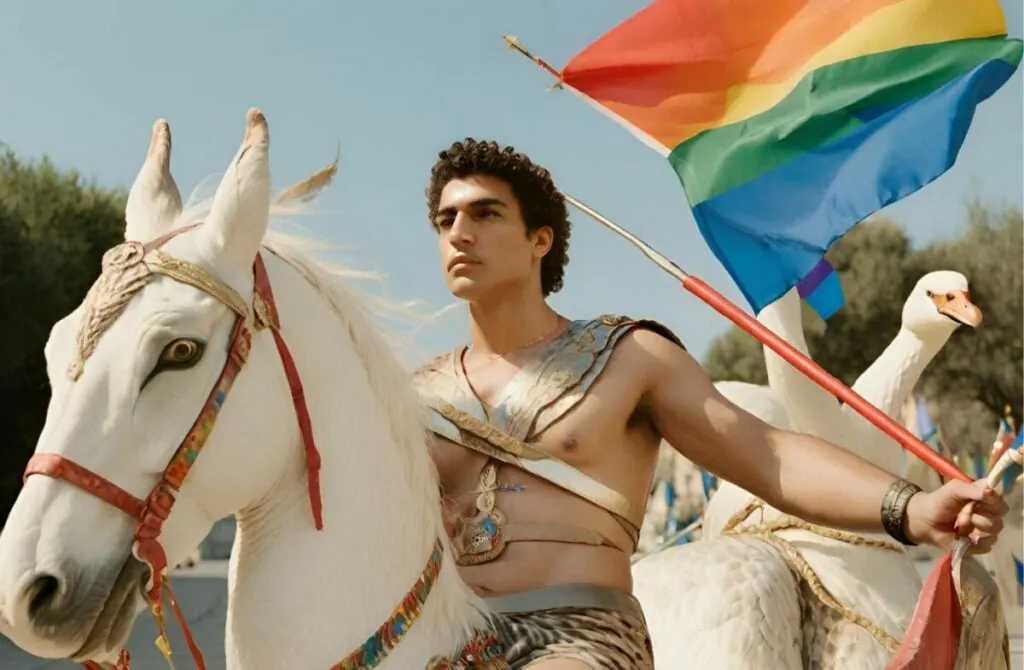
#6) Zeus
Zeus – the lord of the sky and thunder. He is the king of all of the gods who rule from atop Mount Olympus, and the father of a good many of the gods that came after him. He isn’t just famous for being the mighty lord of the heavens, however. He’s also known for being quite the promiscuous soul, and quite lacking in discretionary morals besides. One just needs to take a look at the cat’s-cradle-esque family tree attached to him to get a good idea of that.
Zeus’ antics are well known in Greek legend, and certainly never cease to impress.
Responsible for the birth of half of his children’s children and more demi-gods than perhaps the rest of the Greek gods put together, Zeus is also held as having fallen ‘in love’ with the young adolescent Ganymede, which forms an important part of his legends. Like we said above – Zeus really had some issues when it came to choosing his partners.
He was known for often transforming between forms, genders, and even species to further his affairs with men and alike. That didn’t stop him from being equally bold and in his natural form as a god, however. He married two of his sisters, and is said to have only not married his third and last sister due to the fact that she could not marry whatsoever. On top of that, he also married his aunt, two of his cousins, and the daughter of one of his cousins.

#7) Achilles
Achilles! Famous for featuring in a range of classically inspired movies and having given a story behind the saying ‘Achilles’ Heel’, this great soldier isn’t exactly a deity himself, but his recorded deeds in life gave him a god-like status and a devoted following both in legend and real life.
One of the less-told parts of Achilles’ story, however, is the fundamental fraction including his close relationship with fellow Greek warrior Patroclus. Patroclus was a childhood friend of Achilles, and travelled with him to fight in the Trojan War, where he died and was strongly lamented by Achilles. The matter is a thing of great debate between historians, but a number of classical authors have agreed that the pair shared a romantic partnership.
In discussions of gay Greek gods and their narratives, it’s interesting to note how these stories have influenced literature and culture throughout history. Among notable authors, Shakespeare referenced this theme in his play “Troilus and Cressida,” humorously suggesting that Achilles and Patroclus were too preoccupied with each other to focus on the Trojan War. This interpretation, hinting at a romantic relationship between the two, diverges from Homer’s original depiction, which does not explicitly detail their intimacy in such terms. The notion of Achilles and Patroclus as lovers has persisted into contemporary times, though modern adaptations, like the film “Troy,” often omit this aspect, reflecting varying degrees of acknowledgment and representation of their relationship through the ages.
Achilles is said to have mourned Patroclus’ death as though he were mourning the loss of a wife, using language and remaining in a state that mirrored the throes of widowers and widows at the time. He requested that his bones be mixed with Patroclus’ upon his death.


#8) Ganymede
We mentioned Ganymede when talking about Zeus, but there’s a lot more to the story than just that. Ganymede was the son Dardania’s Tros, from whom the name of the city Troy supposedly comes, but the names of the rest of his family vary depending on the historian consulted. Even the name of Ganymede’s father differs from legend and account, although most agree upon the fact that it was indeed Tros.
With his parentage and familial status laid aside, however, the most famous part of Ganymede’s story lies in his abduction and subsequent anointment as the cupbearer of the gods. That’s right – abduction. We told you that Zeus was quite an undesirable character. Some tales record the young man being brought to Olympus by a bird under the command of Zeus, and some accounts state that this bird was Zeus. Once Ganymede arrived at Mount Olympus, he was granted eternal youth and life, tasked with filling the position of the old cupbearer Hebe who had left to marry Herakles.
After this divine instatement, Zeus formed a romantic attachment to Ganymede, and the two became lovers for quite some time, despite the displeasure of Zeus’s wife Hera. It is not clear how old the young man was at the time, as some tales and pieces of art put him between 18 and 20, while others estimate him as young as 13. Disturbing, yes, but it’s surely clear by this point that Greek mythology is not characterized by kind and consensual themes.

#9) Poseidon
The son of Cronus and his sister Rhea, one of the gods associated with fertility, Poseidon was one of Zeus’s brothers, and almost equally as powerful as him in many measures. While Zeus ruled the sky, Poseidon ruled everything beneath the sea, and often used his powers to threaten the lives of those who failed to respect him or worked against his will.
In the context of gay Greek gods, Poseidon, much like Zeus, is known for his numerous lovers across all genders, with his ‘body count,’ so to speak, reaching well into the hundreds. This prolific nature also extended to his offspring, whose numbers were almost as vast. While many tales of Poseidon stem from the embellished accounts of philosophers rather than the ‘original’ myths that were an integral part of ancient mythology, these stories still clearly showcase the sea god’s vengeful disposition. Poseidon was notoriously quick to retaliate against those who crossed him, demonstrating a remarkable capacity for spite and taking significant offense at even minor acts of defiance.
In fact, so strong was his displeasure at the refusal of King Minos of Crete to cede a rare white bull to him that Poseidon cursed the king’s wife to fall in love with that very bull. Odd choice of revenge, we know. The result of their affair was the Minotaur – a half human, half bull creature that the king then imprisoned in the labyrinth beneath the island of Crete itself as a form of punishment to both his wife and the poor hybrid creature itself
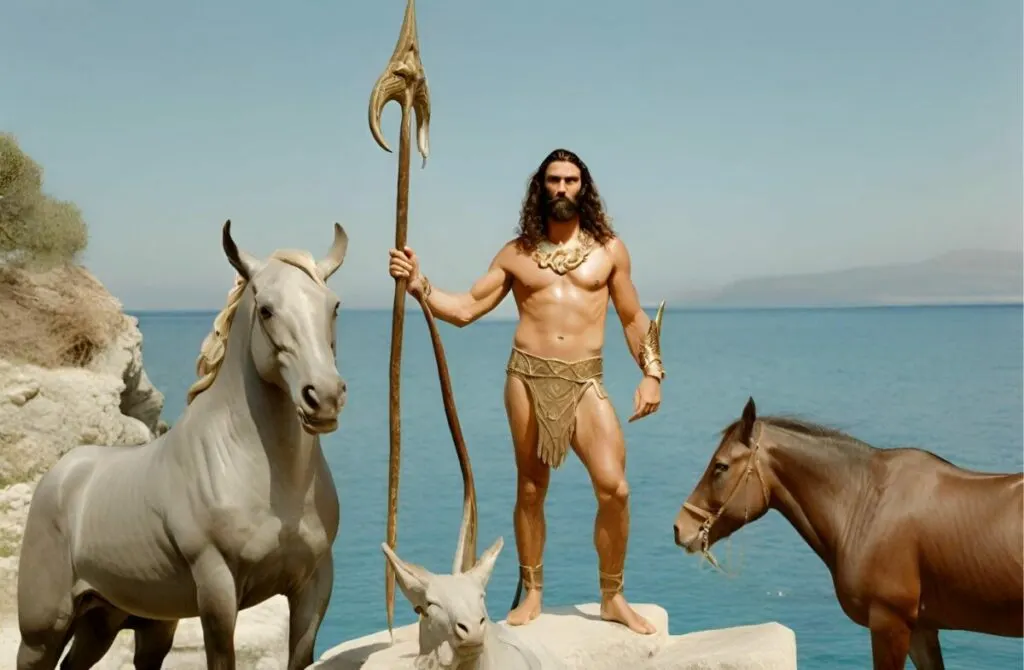
#10) Hermaphroditus
In science a Hermaphrodite refers to an animal or plant that possesses both the characteristics of a male and a female within its species, but the name itself doesn’t come from anything scientific. Quite the opposite, in fact.
The word originates from the Greek God Hermaphroditus, who was the fully male son of Hermes – the messenger of the gods – and Aphrodite, mentioned earlier on this list. The origin of the term came about when Hermaphroditus encountered the water nymph Salmacis, who fell in love with the god and desired to never leave him, so that they could adore one another for all time. She got her wish, as the Gods quite literally put them together, merging their two forms into one body, and giving birth to Hermaphroditus as they are known today – a deity possessing both male and female gender. Hermaphroditus was also counted as a one of the Erotes, winged cupid-like gods associated with love and responsible for arranging romantic affairs under Aphrodite’s command and jurisdiction.
After this point, Hermaphroditus was considered the god of all hermaphrodites and transvestites, protecting and nurturing those who were either permanently or sometimes between genders, and advocating for freedom of expression as a whole. Not only that, but their form was seen as a symbol of unity between men and women, and was used as a patron of weddings and other such ceremonies between dedicated couples. Sounds like a regular legend, and someone we could definitely use as an influence in today’s world.



